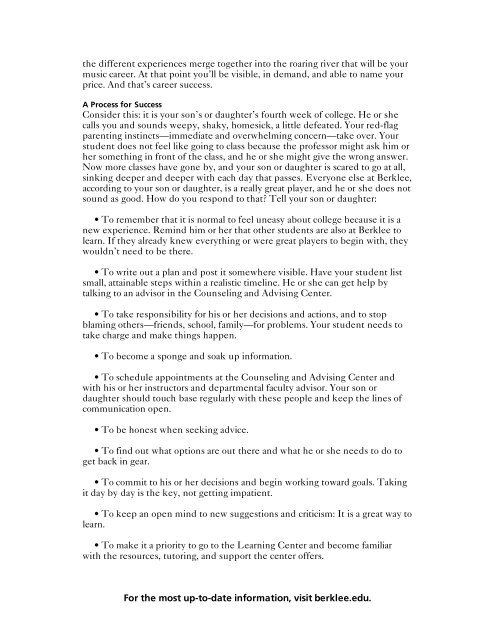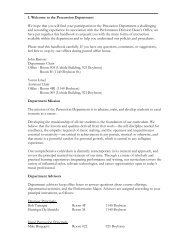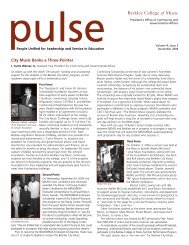Parent Handbook 2010–2011 - Berklee College of Music
Parent Handbook 2010–2011 - Berklee College of Music
Parent Handbook 2010–2011 - Berklee College of Music
Create successful ePaper yourself
Turn your PDF publications into a flip-book with our unique Google optimized e-Paper software.
the different experiences merge together into the roaring river that will be your<br />
music career. At that point you’ll be visible, in demand, and able to name your<br />
price. And that’s career success.<br />
A Process for Success<br />
Consider this: it is your son’s or daughter’s fourth week <strong>of</strong> college. He or she<br />
calls you and sounds weepy, shaky, homesick, a little defeated. Your red-flag<br />
parenting instincts—immediate and overwhelming concern—take over. Your<br />
student does not feel like going to class because the pr<strong>of</strong>essor might ask him or<br />
her something in front <strong>of</strong> the class, and he or she might give the wrong answer.<br />
Now more classes have gone by, and your son or daughter is scared to go at all,<br />
sinking deeper and deeper with each day that passes. Everyone else at <strong>Berklee</strong>,<br />
according to your son or daughter, is a really great player, and he or she does not<br />
sound as good. How do you respond to that? Tell your son or daughter:<br />
• To remember that it is normal to feel uneasy about college because it is a<br />
new experience. Remind him or her that other students are also at <strong>Berklee</strong> to<br />
learn. If they already knew everything or were great players to begin with, they<br />
wouldn’t need to be there.<br />
• To write out a plan and post it somewhere visible. Have your student list<br />
small, attainable steps within a realistic timeline. He or she can get help by<br />
talking to an advisor in the Counseling and Advising Center.<br />
• To take responsibility for his or her decisions and actions, and to stop<br />
blaming others—friends, school, family—for problems. Your student needs to<br />
take charge and make things happen.<br />
• To become a sponge and soak up information.<br />
• To schedule appointments at the Counseling and Advising Center and<br />
with his or her instructors and departmental faculty advisor. Your son or<br />
daughter should touch base regularly with these people and keep the lines <strong>of</strong><br />
communication open.<br />
• To be honest when seeking advice.<br />
• To find out what options are out there and what he or she needs to do to<br />
get back in gear.<br />
• To commit to his or her decisions and begin working toward goals. Taking<br />
it day by day is the key, not getting impatient.<br />
• To keep an open mind to new suggestions and criticism: It is a great way to<br />
learn.<br />
• To make it a priority to go to the Learning Center and become familiar<br />
with the resources, tutoring, and support the center <strong>of</strong>fers.<br />
For the most up-to-date information, visit berklee.edu.
















